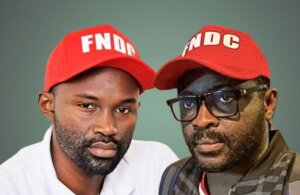
More than a year after the disappearance of two prominent National Front for the Defense of the Constitution (FNDC) figures, Oumar Sylla, also known as Foniké Mengué, and Mamadou Billo Bah, questions continue to swirl over their fate.
Families and supporters have repeatedly demanded clarity, but recent statements by former parliamentarian Taliby Dabo have reignited debate and drawn attention to the judiciary’s silence.
During a press conference, Dabo made remarks that sent shockwaves through political and legal circles. “You are the one who thinks they have disappeared, but I believe it is for reasons of national security.
These men you say have disappeared eat, dress, sleep and follow the news. However, their freedom of movement is restricted.
Since they have been held incommunicado, there has been calm and no problems. I recognize that they no longer live like us in terms of freedoms, but, for security reasons, they must be kept incommunicado,” he stated. He added pointedly: “For someone to be held incommunicado in Guinea, who does it take?”
Legal experts insist that the prosecution must now act. DS Bah, president of the Guinean Organisation for Human Rights (OGDH), said: “Since if a witness—who, I hope, is clear—provides all this information, it is up to the prosecution to take over and accomplish its mission.
Taliby Dabo must reveal the exact whereabouts of Foniké Mengué, Billo Bah, and the others. Otherwise, he should be prosecuted as an accomplice in these kidnappings.”
In July 2024, amid public concern over the disappearances, the Conakry Court of Appeal issued a statement denying detentions and warning that unfounded allegations could “affect national serenity” and “seriously damage the country’s image.”
The prosecutor’s office assured that “no investigative body has arrested or questioned the persons mentioned” and that “no penitentiary establishment in the country is holding Foniké Mengué or Billo Bah,” while promising thorough investigations.
Despite repeated media inquiries, the Attorney General of the Conakry Court of Appeal, Fallou Doumbouya, has remained largely unreachable. Contacted on August 26, 2025, he replied: “You’re calling me without knowing where I am or what I’m doing, and you’re asking me questions. (…) I’m not even in the office,” before ending the call.
Observers warn that this continued silence risks deepening public suspicion and underscores concerns about the judiciary’s commitment to resolving a case that has become a major national and international issue.



